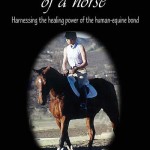
While the presentation of narcissism can often be difficult to tolerate, and certainly challenging for therapists to work with, the elevated sense of self, characteristic grandiosity, and lack of empathy often disguise the underlying feelings of shame and inadequacy. Making treatment of narcissism even more dicey is the narcissist’s persistent denial of any of these feelings, or any flaws whatsoever. However, without becoming aware of what uncomfortable feelings lay under the surface, the prospects for establishing and maintaining healthy relationships remain very fractured for the narcissist. While this may be a sticking place for many therapists, and the narcissist himself, this is also where equine therapy can be helpful.
Horses, being bound by physiological reactions and nonverbal behaviors, can only respond to what the narcissist feels, and not what he consciously presents. Therefore, when the grandiose person acts on his feelings of inadequacy and overcompensates through controlling or self-absorbed behavior, the undetected raising of the heart rate, shallow breathing, and elevations of epinephrine that all go with fear become palpable to the horse.
And in such a situation, the horse will do with the narcissist what they will do with any scared herd member. They will engage in protective behaviors. Circling tightly around the self-involved person, nudging them gently, and displaying concern, their behaviors literally bring the inability to protect oneself in a healthy way to life. The narcissist’s adopted compensatory mechanisms are not viewed by the horse as “safe” by the horse, because they do not cure the inadequacy and restore feelings of confidence, connection to others, and emotional safety to the overly sensitive narcissist. So, to be safe then, the grandiose person must be protected, as he is not capable of really protecting himself emotionally, and therefore, a horse perceives him as not safe alone.
Interestingly, while narcissists have a habit of repelling people, often horses will register the opposite reaction. This is, of course, because our four legged friends cannot be swayed by the self-absorbed performance of the narcissist, and instead respond to the often underlying emotional trauma (research suggests that narcissism develops as a result of empathic attachment either through abuse, or overvaluation in the absence of realistic feedback).
However the value of horses in working with narcissists is not just in their attunement to the unconscious driving forces of the grandiosity, but in their subtle delivery. As we know, a narcissist would certainly not tolerate any admission of inadequacy, or any suggestion of lack of emotional safety. Yet the experience of a horse offering himself in a calm and protective way to the narcissist is often quite relieving of a need that is not met through human interaction.
This is rather amazing in its insight … horses are healing to humanity. Thanks for this article!